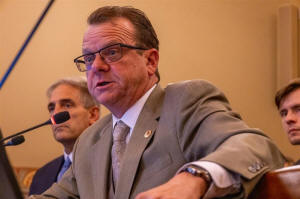Pritzker vetoes measure granting Ameren authority over transmission line
construction
 Send a link to a friend
Send a link to a friend
[August 17, 2023]
By ANDREW ADAMS
Capitol News Illinois
aadams@capitolnewsillinois.com
 Gov. JB Pritzker on Wednesday vetoed a measure that would have granted
existing utilities in downstate Illinois, notably Ameren Illinois, the
“right of first refusal” for transmission line construction. Gov. JB Pritzker on Wednesday vetoed a measure that would have granted
existing utilities in downstate Illinois, notably Ameren Illinois, the
“right of first refusal” for transmission line construction.
This would have given Ameren, the electric utility that serves much of
downstate Illinois, authority to build new transmission lines without
going through a competitive bidding process under federal regulations
for any projects approved by the Midcontinent Independent System
Operator, or MISO, before the end of 2024.
The governor issued what’s called an amendatory veto, striking only the
portion of House Bill 3445 that deals with the right of first refusal.
He left the rest of the bill, which modifies a state grant program and
requires several policy studies, untouched.
These projects, and those who will profit from them, have been gaining
attention recently. As the country moves toward carbon-free energy
transmission, billions of dollars of construction will be required to
transport the electricity from new, renewable sources. The National
Renewable Energy Laboratory suggested in a 2022 study that to achieve
100 percent clean electricity, the nation could need as much as three
times the transmission capacity as it currently has.
Last summer, MISO, the organization that manages the electric grid in
downstate Illinois and in 14 other states, approved a $10.3 billion
portfolio of projects across the Midwest. The group is expected to
approve another multi-billion-dollar portfolio in 2024.

Pritzker wrote in a letter to lawmakers explaining his veto that the
proposal puts “corporate profits over consumers.”
“Without competition, Ameren ratepayers will pay for these transmission
projects at a much higher cost,” Pritzker wrote. “Competitively bidding
transmission construction, instead of giving the utility a monopoly, has
been shown to lower costs significantly.”
Lawmakers will have the option of accepting the governor’s changes,
overriding the veto so that the bill becomes law as passed, or letting
it die due to the veto.
The bill’s chief sponsor, Rep. Larry Walsh, D-Elwood, told Capitol News
Illinois that he stands by the policy and will try to pass the bill over
the governor’s objection during the legislature’s veto session, which
begins in October.
“I’m gonna work my bill. I know how the vote went, I know the nuts and
bolts of it,” Walsh said.
“I’m filing for an override. I went down there to protect Illinois
workers. That’s what I’m going to do.”
Walsh stressed that he sees the bill as being beneficial to laborers. In
his view, the competitive bid process opens up transmission line
construction to out-of-state companies, over which the state has less
oversight.
[to top of second column]
|

State Rep. Larry Walsh, D-Elwood, is
pictured in an Illinois House committee room earlier this year. He
said he is going to try to override Gov. JB Pritzker's veto of a
bill that would have granted existing utilities in downstate
Illinois, notably Ameren Illinois, the “right of first refusal” for
transmission line construction. (Capitol News Illinois photo by
Andrew Adams)

Allowing Ameren control over transmission projects, Walsh said, would
have ensured Illinois unions were employed for the projects under
Illinois’ worker protections, and the Illinois Commerce Commission would
have had oversight authority on any profits made by Ameren from the
projects.
Overriding the governor’s veto may prove challenging, as the proposal
split organized labor and environmental groups, two core parts of the
Democrats’ base.
It also split the Democrats’ legislative supermajorities, passing on a
41-9 vote in the Senate, with one senator voting “present,” and a 63-32
vote in the House, with two voting “present.” The bill would need 36
votes in the Senate and 71 votes in the House to override the veto.
Corey Stone, the assistant business manager for IBEW Local 51, advocated
for the proposal when it went through the legislature in May. He said
his union was “disappointed” in the veto.
In a statement, Shawn Schukar, the head of Ameren’s transmission arm,
said that the veto would result in “unnecessary delays” to transmission
construction and that such projects should be managed by a “trusted
local energy companies with a proven track record of success, who
already competitively bid the projects with local contractors and union
workers.”
Environmental groups, however, quickly celebrated the move. Jen Walling,
the head of the Illinois Environmental Council, said in a statement that
lawmakers were not given enough time to consider the implications of the
bill when they voted on it.
“We cannot further delay clean energy adoption, particularly in central
and southern Illinois communities that have long been burdened with
predatory practices from utilities like Ameren,” Walling said. “Gov.
Pritzker’s veto of this bill will allow Illinois to bring large-scale
clean energy projects online in a competitive market, which will keep
costs low and protect consumers.”

Others, like the Illinois Clean Jobs Coalition, believed the bill would
have “given a big handout to the big utility without providing any
protections for workers or customers.”
Capitol News Illinois is a nonprofit, nonpartisan news
service covering state government. It is distributed to hundreds of
print and broadcast outlets statewide. It is funded primarily by the
Illinois Press Foundation and the Robert R. McCormick Foundation, along
with major contributions from the Illinois Broadcasters Foundation and
Southern Illinois Editorial Association. |